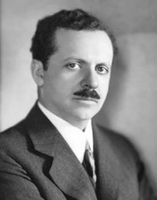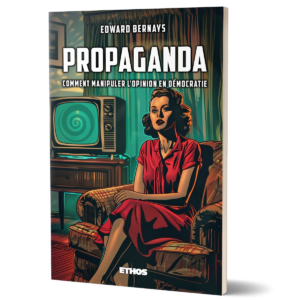Edward Bernays

Edward Louis Bernays (1891-1995) est un publicitaire austro-américain. Il devient journaliste, puis rédacteur en 1912 et coéditeur de la revue médicale Medical Review of Review, et enfin agent de presse. Il est à deux titres le neveu du psychanalyste Sigmund Freud, neveu germain et neveu par alliance : son père, Ely Bernays (1860-1923), est le frère de Martha Bernays, l’épouse de Freud, sa mère, Anna Freud (1858-1955) est l’une des sœurs de Freud. Son grand-oncle, le philologue Jacob Bernays, fut « le premier juif pratiquant à être nommé sur un poste proprement universitaire dans l’Allemagne du dix-neuvième siècle ». Il a été marié à l’écrivaine et activiste féministe Doris E. Fleischman avec qui il a eu deux filles, Doris et Anne Bernays. Il est le grand-oncle paternel de Marc Randolph, le cofondateur et premier PDG de la société Netflix. Edward Bernays est considéré comme le père de la propagande politique et d’entreprise, ainsi que de l’industrie des relations publiques, qui ont fortement contribué à développer le consumérisme américain.
En français :
Propaganda : Comment manipuler l’opinion en démocratie (1928-2024).
En anglais :
The Broadway Anthology, New York, Duffield & Co. (1917).
Crystallizing Public Opinion, New York, Boni and Liveright (1923).
A Public Relations Counsel (1927).
An Outline of Careers: A Practical Guide to Achievement by Thirty-Eight Eminent Americans (1927).
Verdict of Public Opinion on Propaganda (1927).
Propaganda. New York: Horace Liveright (1928).
This Business of Propaganda (1928).
Universities—Pathfinders in Public Opinion (1937).
Careers for Men: A Practical Guide to Opportunity in Business, Written by Thirty-Eight Successful Americans (1939).
Speak Up for Democracy: What You Can Do—A Practical Plan of Action for Every American Citizen. New York: The Viking Press (1940).
Future of Private Enterprise in the Post-War World (1942).
Democratic Leadership in Total War (1943).
Psychological Blueprint for the Peace—Canada, U.S.A. (1944).
Public Relations (1945).
Your Place at the Peace Table. What You Can Do to Win a Lasting United Nations Peace. New York: The Gerent Press (1945).
What the British Think of Us: A Study of British Hostility to America and Americans and Its Motivation, with Recommendations for Improving Anglo-American Relations, with Doris Fleischman (1950).
The Engineering of Consent (as contributor). Norman: University of Oklahoma Press (1955).
Your Future in Public Relations (1961).
Survey of the World’s Greatest Square Mile: Manhattan Island Below Fulton Street. New York: One Wall Street (1964).
Biography of an Idea: Memoirs of Public Relations Counsel. New York: Simon and Schuster (1965).
The Case for Reappraisal of U.S. Overseas Information Policies and Programs (Incorporating Congressman Fascell’s Report), with Burnet Hershey, eds. New York: Praeger (1970).

